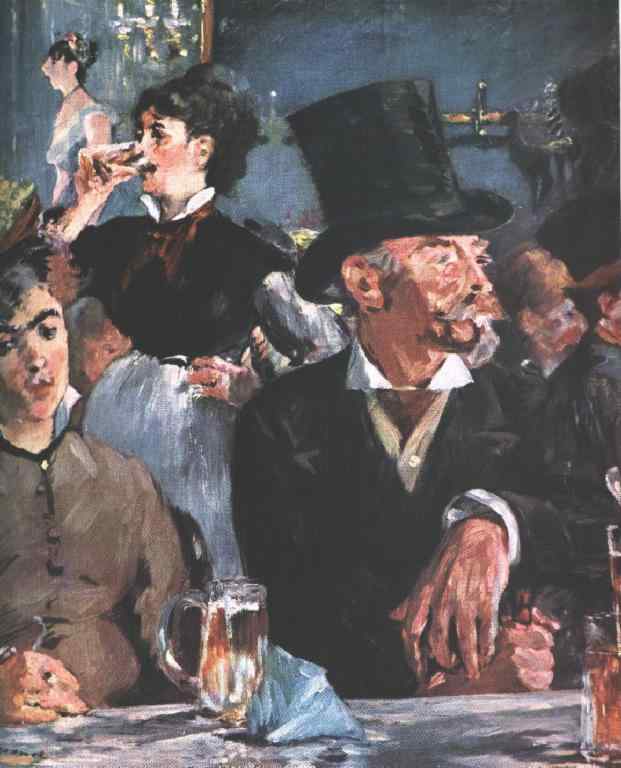|
Café-Concert
(also seen it titled)
Au
Café
Edouard Manet -- French
Painter
1878
Baltimore Maryland
The Walters Art Gallery
Oil on canvas
47.5 x 30.2 cm (18 5/8
x 15 3/8
in)
jpg: Jim's
Fine Art Collection
(Click
on the image to step
closer)
Cafés
were the heart of Parisian life and painters would meet to discuss and
argue the theories and schools of thought.
In Manet's painting, with
the exception of the man with the top-hat, each person in the painting
is either cut off by the frame or is partially overlapped by others. The
man with the hat is the person we're sitting across and looking at, but
he is not our central focus -- the room itself is our focus.
An interesting
painting.
When I look
at this I can feel the energy of the café. I can even hear in my
mind's ear the noise of the surrounding conversations, the clinking of
glass on the hard surface of tables, and silverware against porcelain (though
I don't know if they served food). I have been in so many cafés
exactly like this (or nearly so) that the painting comes to life for me.
Manet has captured an instant in time.
Now isn't this
really how we experience a café? Is not our cognition of all the
motion around us, all the other people somehow truncated, fragmented by
the narrow focus of our own group we're with? We hear an answer from the
next table, but not the question. We hear a laugh, but not the punch line.
We see someone leaning and whispering, but the words are absent. We sense
people moving about, but they are faceless. In that moment between thoughts,
when our own conversation has reached a pause, when everyone in our party
is staring in different directions, all these external things float in
upon us, but none of them are complete -- not in that moment -- like
a snapshot, the energy of the room is captured, but only as impressions
to be filtered and filled in by our mind.
The setting in this painting is the
brasserie-concert "Au cabaret de Reichshoffen" on the boulevard Rochechouart,
which served Manet as a setting for The Beer Waitress. (Henri
Lallemand, Manet, A Visionary Impressionist, P.77)
But the painting came about almost
as an accident, read what BM Putnam writes me:
Natasha,
I just read your article on
Manet's At the Cafe. I also find the painting interesting
and complex. However, you may want to revise some of your material.
Manet's painting was inspired
by Degas Absinthe Drinker (1876). The same models appeared in both
paintings, but in Manet's they are older and more distinguished.
At the Cafe [this painting
above] was cut from an original painting entitled La Brasserie de Reischshoffen.
Also cut from the original painting was, a Waitress Serving Beer
and At the Cafe (another painting with the same title). After
the original painting was cut, Manet restreched At the Cafe (Cafe-Concert)
and repainted it. The only figure he did not repaint was the man with the
top hat. It is possible, the figures are cut off because of the cutting
of the original painting.
Cafe's were a meeting place
for many artists where they exchanged ideas and many paintings were inspired
by the cafe environment. If cafe's were a place to meet and exchange
ideas, why are none of the subjects looking at each other? Each is
starring off into a daze and in deep thought, except for the waitress drinking
beer who is not concerned with her customers (the man and the woman). Even
the singer is starring away from her audience. When studying the
subjects, I wonder what Manet's intentions were.
Just thought I would raise
a few issues. Thank you for taking the time to make a web page on
what I believe to be one of Manet's best pieces.
BM
Putnam
Great comments BMP. Why revise when
you said it better than I could.
Notes
|












